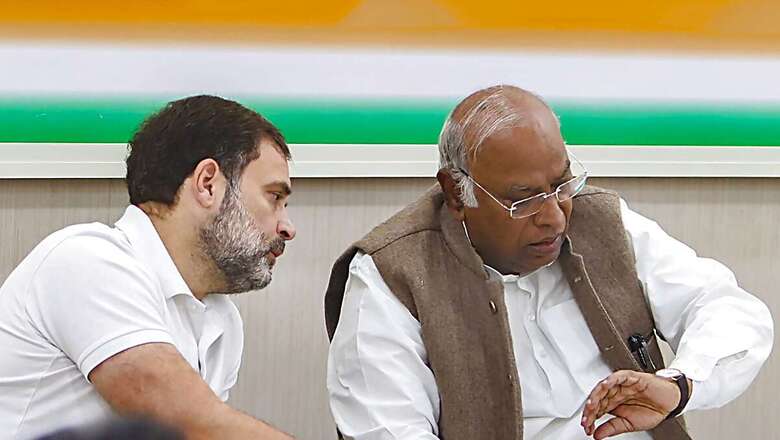
views
The Congress party, once the beacon of India’s political landscape, is now facing an exodus of its leaders. This mass departure is not a sudden phenomenon but the culmination of a series of internal issues that have been brewing for years. Recently, spokesperson Gaurav Vallabh left the party again, sparking the same debate of exodus.
The ideological shift of the party, primarily influenced by the Left and Rahul Gandhi’s strong pro-left liberal views, has significantly altered its original stance. This shift has left many of its members feeling alienated, questioning whether the Congress still represents their beliefs and values. Moreover, the party’s strategy of incessantly criticising the prime minister without providing substantial alternatives has created a sense of insecurity among its supporters. The lack of a clear vision and roadmap has left supporters feeling disconnected from the party’s core, further fueling the exodus.
The inconsistent functioning of the Congress has also raised questions about its internal fairness and equality. The contrasting treatment of Sachin Pilot and Sanjay Nirupam, both expressing dissent, has left many puzzled and questioning the party’s commitment to its members.
Lastly, the centralisation of power around the Gandhis, with decisions predominantly made by them rather than fully empowering President Mallikarjun Kharge, has led to frustration among its leaders. This lack of decentralisation is hindering the grand old party’s ability to make crucial decisions, pushing its leaders to seek alternatives.
In conclusion, the Congress’ ideological shift, lack of clear vision, inconsistent functioning, and centralisation of power are driving its leaders away. It’s high time the party examines and takes the necessary measures to prevent further erosion of its leadership and supporter base.
Leftward Drift
The Congress party, once a beacon of centrism in India’s political landscape, has been grappling with a significant ideological shift. This transformation, primarily influenced by the Left and Rahul Gandhi’s staunch pro-left liberal views, has not been well-received by many within the party. In the Bharat Jodo Yatra, Gandhi did not hide his liking for liberals, as more and more of them joined the Yatra. Before 2019, the Congress, with the help of leftist economists, created the NYAY scheme, but it failed miserably as there were no takers.
Historically, the Congress has been a melting pot of ideologies, balancing both left and right. However, recent years have seen a noticeable tilt towards the left. This shift, while reflective of Rahul Gandhi’s strong pro-left liberal views and the growing influence of left-wing ideologies, has led to internal discord and confusion among the party’s grassroots cadres and leaders.
The party’s recent manifesto echoes this leftward shift, further alienating many of its members and supporters. The stringent leftist view, once an adopted stance, has now become a defining characteristic of the Congress’ ideology. This has led to a sense of disillusionment among those who once identified with the party’s centrist approach. The ideological shift has left the party at a crossroads.
The grand old party, which once prided itself on its ability to represent a diverse range of views, now finds itself in a state of ideological flux. The party’s shift towards left-liberalism has left many of its members feeling disconnected and confused, questioning the party’s future direction.
The party must navigate this ideological shift carefully, balancing its new ideological stance with the diverse views of its members and supporters. The challenge lies in ensuring that this ideological evolution does not lead to further fragmentation within the party.
Criticism without Alternatives – A Path to Disconnect?
The Congress party, once a formidable force in Indian politics, seems to be stuck in a repetitive pattern of criticising Prime Minister Modi without offering substantial alternatives. This approach, especially evident in the run-up to the 2024 Lok Sabha elections, has created a sense of insecurity among its supporters, who feel increasingly disconnected from the party’s core.
The party’s key strategy appears to be personal attacks on the prime minister, a tactic reminiscent of the 2019 Lok Sabha elections when Rahul Gandhi coined the phrase “Chowkidar Chor Hai”. However, the election results made it clear that such attacks were not well-received by the public.
Adding to the party’s woes is the exodus of leaders, not just those who left before the Lok Sabha elections, but also top leaders like Ghulam Nabi Azad. This trend is not limited to the national level; state-level leaders are also leaving the party. While it’s easy to dismiss these departures as driven by fear or personal gain, the Congress must realise the importance of introspection.
The party needs to understand that criticism without offering alternatives is not a sustainable strategy. It risks alienating supporters and creating a leadership vacuum. The party must focus on reconnecting with its base, offering substantial policy alternatives, and addressing the concerns of its leaders. Only then can it hope to regain its lost ground and emerge as a strong contender in future elections.
Congress’ Inconsistent Approach
In the grand theatre of Indian politics, the Congress party’s recent actions have highlighted a perplexing narrative of inconsistency. The treatment of Sachin Pilot and Sanjay Nirupam, two prominent figures within the party, has unfolded like a tale of two cities, reflecting disparate responses to dissent.
Sachin Pilot, the young turk of the Congress, has been vocal about his discontent for a considerable time. Yet, the party’s leadership chose a path of inaction, allowing the discord to simmer without intervention. This prolonged period of passivity towards Pilot’s dissent raises questions about the party’s internal conflict resolution mechanisms and its tolerance for divergent voices.
In stark contrast stands the case of Sanjay Nirupam, a seasoned Maharashtra Congress politician with years of service. His dissent against the Congress-Shiv Sena (UBT) alliance was met with swift and decisive action by the party, a move that seems to contradict the leniency shown to Pilot. This dichotomy in handling internal disagreements has led to a perception of arbitrariness, casting a shadow over the principles of fairness and equality that are foundational to any democratic institution.
The disparity in the party’s reactions is not just a matter of individual personalities but speaks to a larger issue of organisational coherence. It suggests a selective approach to dissent, possibly influenced by political calculations rather than a uniform set of principles. Such an approach can lead to an erosion of trust among party members and supporters alike, as it projects an image of unpredictability and favouritism.
For a party with a storied legacy and a central role in India’s political landscape, the need for a consistent and transparent approach to internal dissent is paramount. It is essential for the Congress to consider and realign its actions with its avowed values of inclusivity and internal democracy. Only then can it hope to present a united front and regain the confidence of the electorate.
In conclusion, the contrasting treatment of Pilot and Nirupam is a reflection of the challenges facing the Congress. To move forward, the party must address these inconsistencies and reaffirm its commitment to fairness and equality. The path ahead is fraught with challenges, but it is only through embracing these values that the Congress can hope to chart a course towards revival and relevance.
Gandhi Family Centrism
In the grand tapestry of Indian politics, the Congress has long been a central figure. However, the current political climate within the grand old party suggests a centralisation of power that could be its Achilles’ heel. The Gandhis, a family synonymous with the party’s legacy, appear to be at the core of decision-making processes, overshadowing the role of President Mallikarjun Kharge. This centralisation is more than a mere power play; it is a strategic misstep that is causing internal strife and impeding the party’s progress.
As the 2024 Lok Sabha election looms, the Congress’s reluctance to decentralise authority is palpable. Kharge, despite holding the presidential mantle, seems to have his hands tied, unable to make pivotal decisions independently. This bottleneck in leadership is not just about inefficiency, it reflects a deeper issue of trust and empowerment within the party ranks. The significance of this cannot be overstated, as it leads to frustration among leaders who are eager to contribute to the party’s vision and strategy.
The delay in announcing candidates for key constituencies like Raebareli and Amethi is indicative of this centralised approach. These seats are not just electoral territories, they are symbolic of the Congress’ historical stronghold. The hesitation to declare candidates signals a lack of preparedness and a possible fear of deviating from the traditional script written by the Gandhis. It raises questions about the party’s readiness for the upcoming electoral battle and its ability to adapt to the changing dynamics of Indian politics.
For the Congress to navigate the turbulent waters of the 2024 elections successfully, it must embrace a more decentralised model of leadership. Empowering figures like Kharge to take the helm could invigorate the party with fresh perspectives and strategies. It is time for the Congress to break free from the gravitational pull of the Gandhis and chart a course that is inclusive, democratic, and forward-thinking. Only then can it hope to regain its lost glory and re-establish itself as a formidable force in Indian politics.
(The author, a columnist and research scholar, teaches journalism at St. Xavier’s College (autonomous), Kolkata. He tweets at @sayantan_gh. Views expressed in the above piece are personal and solely that of the author. They do not necessarily reflect News18’s views.)


















Comments
0 comment